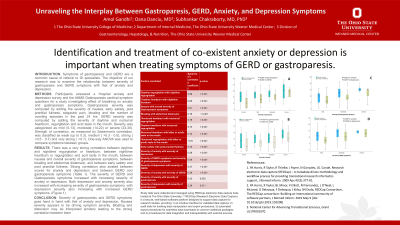Tuesday Poster Session
Category: Functional Bowel Disease
P3367 - Unraveling the Interplay Between Gastroparesis, GERD, Anxiety, and Depression Symptoms
Tuesday, October 24, 2023
10:30 AM - 4:00 PM PT
Location: Exhibit Hall

Has Audio

Amol Gandhi, BS
The Ohio State University
Columbus, Ohio
Presenting Author(s)
Amol Gandhi, BS, Oana Danciu, MD, Subhankar Chakraborty, MD, PhD
The Ohio State University, Columbus, OH
Introduction: Symptoms of gastroparesis and GERD are a common cause of referral to GI specialists. The objective of our research was to examine the relationship between severity of gastroparesis and GERD symptoms with that of anxiety and depression.
Methods: Participants answered the Hospital anxiety and depression survey and the ANMS Gastroparesis cardinal symptom questions as part of screening questionnaire for a study investigating effect of breathing on anxiety and gastroparesis symptoms. The severity of gastroparesis was computed by adding the severity of nausea, early satiety, post prandial fullness, epigastric pain, bloating and the number of vomiting episodes in the past 24 hrs. GERD severity was computed by adding the severity of daytime and nocturnal heartburn, regurgitation and acid taste in the mouth. Severity of Gastroparesis or GERD symptoms was categorized as mild (5-13), moderate (14-22) or severe (23-30). Strength of correlation measured by Spearman's correlation was classified as weak (upto 0.3), medium ( >0.3 upto 0.5), strong ( >0.5 and upto 0.7) and very strong ( >0.7). One-way ANOVA was used to compare symptoms between groups
Results: 77 participants completed the questionnaires. There was a very strong correlation between daytime and nighttime regurgitation or heartburn, between nighttime heartburn or regurgitation and acid taste in the mouth, between nausea and overall severity of gastroparesis symptoms, between bloating and abdominal distension, and between early satiety and post prandial fullness. There was a strong correlation between scores for anxiety and depression, and between GERD and gastroparesis symptoms (Table 1). The severity of GERD and Gastroparesis symptoms increased with increasing severity of anxiety or depression. Conversely the severity of depression increases with increasing severity of GERD or gastroparesis symptoms. Severity of anxiety increases with increasing severity of gastroparesis symptoms. (Figure 1)
Discussion: Severity of gastroparesis and GERD symptoms goes hand in hand with that of anxiety and depression and the converse is also true. The severity of nausea appears to be driving the reported severity of gastroparesis symptoms. Bloating and distension may be interpreted similarly leading to the strong correlation between them. Our results suggest that identification and treatment of co-existent anxiety or depression is important when treating symptoms of GERD or gastroparesis.

Disclosures:
Amol Gandhi, BS, Oana Danciu, MD, Subhankar Chakraborty, MD, PhD. P3367 - Unraveling the Interplay Between Gastroparesis, GERD, Anxiety, and Depression Symptoms, ACG 2023 Annual Scientific Meeting Abstracts. Vancouver, BC, Canada: American College of Gastroenterology.
The Ohio State University, Columbus, OH
Introduction: Symptoms of gastroparesis and GERD are a common cause of referral to GI specialists. The objective of our research was to examine the relationship between severity of gastroparesis and GERD symptoms with that of anxiety and depression.
Methods: Participants answered the Hospital anxiety and depression survey and the ANMS Gastroparesis cardinal symptom questions as part of screening questionnaire for a study investigating effect of breathing on anxiety and gastroparesis symptoms. The severity of gastroparesis was computed by adding the severity of nausea, early satiety, post prandial fullness, epigastric pain, bloating and the number of vomiting episodes in the past 24 hrs. GERD severity was computed by adding the severity of daytime and nocturnal heartburn, regurgitation and acid taste in the mouth. Severity of Gastroparesis or GERD symptoms was categorized as mild (5-13), moderate (14-22) or severe (23-30). Strength of correlation measured by Spearman's correlation was classified as weak (upto 0.3), medium ( >0.3 upto 0.5), strong ( >0.5 and upto 0.7) and very strong ( >0.7). One-way ANOVA was used to compare symptoms between groups
Results: 77 participants completed the questionnaires. There was a very strong correlation between daytime and nighttime regurgitation or heartburn, between nighttime heartburn or regurgitation and acid taste in the mouth, between nausea and overall severity of gastroparesis symptoms, between bloating and abdominal distension, and between early satiety and post prandial fullness. There was a strong correlation between scores for anxiety and depression, and between GERD and gastroparesis symptoms (Table 1). The severity of GERD and Gastroparesis symptoms increased with increasing severity of anxiety or depression. Conversely the severity of depression increases with increasing severity of GERD or gastroparesis symptoms. Severity of anxiety increases with increasing severity of gastroparesis symptoms. (Figure 1)
Discussion: Severity of gastroparesis and GERD symptoms goes hand in hand with that of anxiety and depression and the converse is also true. The severity of nausea appears to be driving the reported severity of gastroparesis symptoms. Bloating and distension may be interpreted similarly leading to the strong correlation between them. Our results suggest that identification and treatment of co-existent anxiety or depression is important when treating symptoms of GERD or gastroparesis.

Figure: Figure 1.Box plot showing comparison of GERD and Gastroparesis scores between participants stratified by severity of anxiety (A) or depression (B) and comparing severity of anxiety and depression between participants stratified by severity of Gastroparesis (C) and GERD symptoms (D) . The p-value is that of one-way ANOVA test
Disclosures:
Amol Gandhi indicated no relevant financial relationships.
Oana Danciu indicated no relevant financial relationships.
Subhankar Chakraborty: Coloplast – Consultant. Medtronic – Consultant.
Amol Gandhi, BS, Oana Danciu, MD, Subhankar Chakraborty, MD, PhD. P3367 - Unraveling the Interplay Between Gastroparesis, GERD, Anxiety, and Depression Symptoms, ACG 2023 Annual Scientific Meeting Abstracts. Vancouver, BC, Canada: American College of Gastroenterology.
